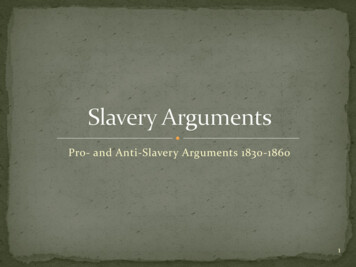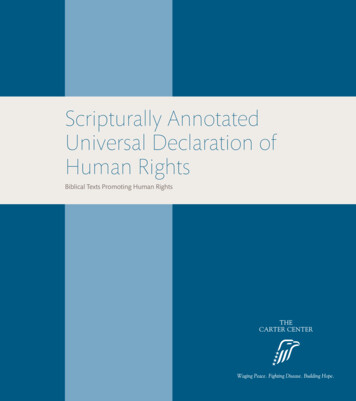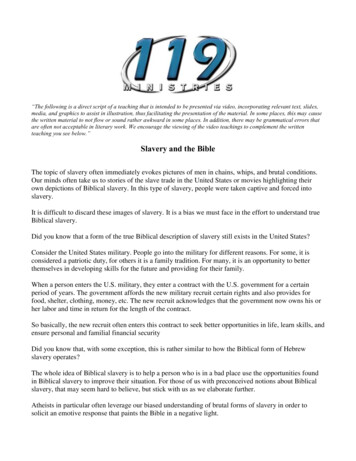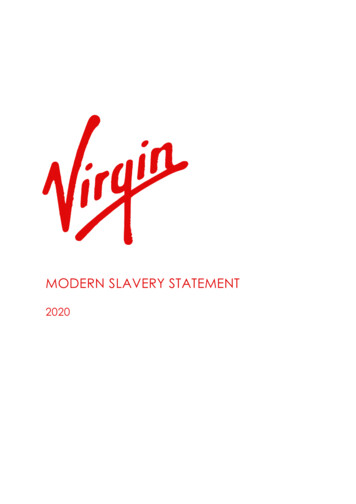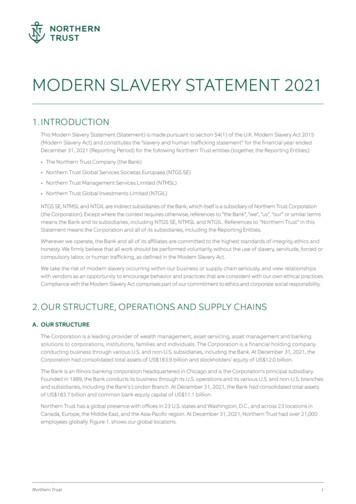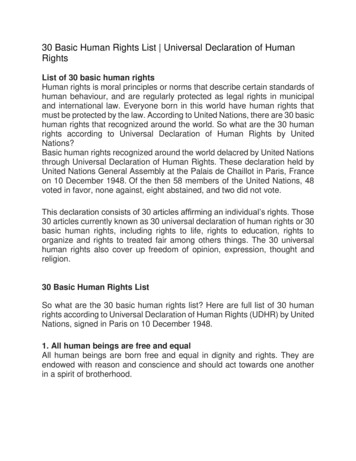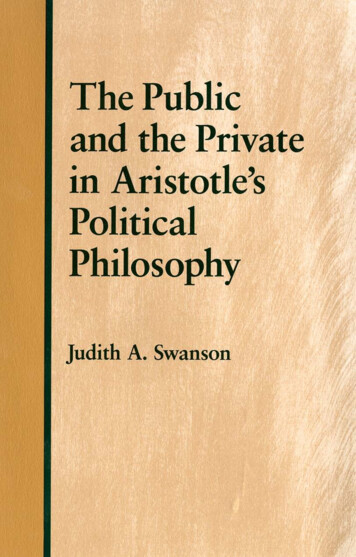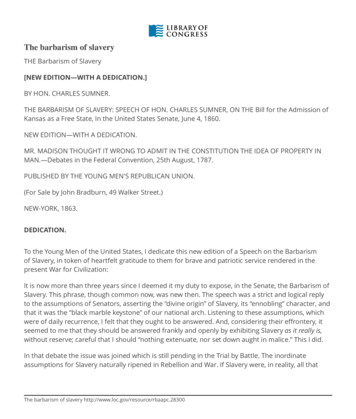
Transcription
The barbarism of slaveryTHE Barbarism of Slavery[NEW EDITION—WITH A DEDICATION.]BY HON. CHARLES SUMNER.THE BARBARISM OF SLAVERY: SPEECH OF HON. CHARLES SUMNER, ON THE Bill for the Admission ofKansas as a Free State, In the United States Senate, June 4, 1860.NEW EDITION—WITH A DEDICATION.MR. MADISON THOUGHT IT WRONG TO ADMIT IN THE CONSTITUTION THE IDEA OF PROPERTY INMAN.—Debates in the Federal Convention, 25th August, 1787.PUBLISHED BY THE YOUNG MEN'S REPUBLICAN UNION.(For Sale by John Bradburn, 49 Walker Street.)NEW-YORK, 1863.DEDICATION.To the Young Men of the United States, I dedicate this new edition of a Speech on the Barbarismof Slavery, in token of heartfelt gratitude to them for brave and patriotic service rendered in thepresent War for Civilization:It is now more than three years since I deemed it my duty to expose, in the Senate, the Barbarism ofSlavery. This phrase, though common now, was new then. The speech was a strict and logical replyto the assumptions of Senators, asserting the “divine origin” of Slavery, its “ennobling” character, andthat it was the “black marble keystone” of our national arch. Listening to these assumptions, whichwere of daily recurrence, I felt that they ought to be answered. And, considering their effrontery, itseemed to me that they should be answered frankly and openly by exhibiting Slavery as it really is,without reserve; careful that I should “nothing extenuate, nor set down aught in malice.” This I did.In that debate the issue was joined which is still pending in the Trial by Battle. The inordinateassumptions for Slavery naturally ripened in Rebellion and War. If Slavery were, in reality, all thatThe barbarism of slavery http://www.loc.gov/resource/rbaapc.28300
it was said to be by its representatives, they must have failed in duty if they did not vindicate andadvance it. Not easily could they see a thing so “divine” and so “ennobling”—constituting the “blackmarble keystone” of our national arch—discredited by a popular vote, even if not yet doomed tosacrifice.The election of Mr. Lincoln was a judgment against Slavery, and its representatives were aroused.Meanwhile, for more than a generation, an assumption of constitutional law, hardly less outrageous,had become rooted side by side with Slavery, so that the two had shot up in rank luxuriancetogether. It was assumed that any State was privileged, under the Constitution, at any time, in theexercise of its own discretion, to withdraw from the Union. This absurdity found little favor at first,even among the representatives of Slavery. To say that two and two make five could not be moreirrational. But custom and constant repetition gradually produced an impression, until, at last, allwho were maddest for Slavery were equally mad for this disorganizing ally.It was under the shadow of this constitutional assumption that the assumption for Slavery grew intovirulent vigor, so that, at last, when Mr. Lincoln was elected, it broke forth in open war; but the warwas declared in the name of State Rights.Therefore, there are two apparent rudiments to this war. One is Slavery and the other is State Rights.But the latter is only a cover for the former. If Slavery were out of the way there would be no troublefrom State Rights.The war, then, is for Slavery, and nothing else. It is an insane attempt to vindicate by arms thelordship which had been already asserted in debate. With mad-cap audacity it seeks to install thisBarbarism as the truest Civilization. Slavery is declared to be the “corner-stone” of the new edifice.This is enough.The question is thus presented between Barbarism and Civilization; not merely between twodifferent forms of Civilization, but between Barbarism on the one side and Civilization on the otherside. If you are for Barbarism, join the Rebellion, or, if you can not join it, give it your sympathies. Ifyou are for Civilization, stand by the Government of your country with mind, soul, heart, and might!Such is the issue simply stated. On the one side are women and children on the auction-block;families rudely separated; human flesh lacerated and seamed by the bloody scourge; labor extortedwithout wages; and all this frightful, many-sided wrong is the declared foundation of a mockcommonwealth. On the other side is the Union of our Fathers, with the image of “Liberty” on its coinand the sentiment of Liberty in its Constitution, now arrayed under a patriotic Government, whichThe barbarism of slavery http://www.loc.gov/resource/rbaapc.28300
insists that no such mock Commonwealth, having such a declared foundation, shall be permitted onour territory, purchased with money and blood, to impair the unity of our jurisdiction and to insultthe moral sense of mankind.Therefore, the battle which is now waged by the Union is for Civilization itself, and it must have aidand God-speed from all who are not openly for Barbarism. There is no word of peace, no tone ofgentleness, no whisper of humanity, which does not become trumpet-tongued against the Rebellion.War itself seems to “smooth its wrinkled front” as it undertakes the championship of such a cause.The armed soldier becomes a minister of mercy.“The Cid was in the midst, his shout was heard afar; I am Rui Diez, the champion of Bivar; Strikeamongst them, gentlemen, for sweet mercy's sake.”In the name of mercy, strike, young men, so that the revolting Barbarism, which began the war, shalldisappear forever. Any thing less than this will be an abandonment of duty.CHARLES SUMNER.Washington, 4 th July, 1863.SPEECH.Mr. President: Undertaking now, after a silence of more than four years, to address the Senateon this important subject, I should suppress the emotions natural to such an occasion, if I didnot declare on the threshold my gratitude to that Supreme Being, through whose benign careI am enabled, after much suffering and many changes, once again to resume my duties here,and to speak for the cause which is so near my heart. To the honored Commonwealth whoserepresentative I am, and also to my immediate associates in this body, with whom I enjoy thefellowship which is found in thinking alike concerning the Republic, I owe thanks which I seize thismoment to express for the indulgence shown me throughout the protracted seclusion enjoined bymedical skill; and I trust that it will not be thought unbecoming in me to put on record here, as anapology for leaving my scat so long vacant, without making way, by resignation, for a successor, thatI acted under the illusion of an invalid, whose hopes for restoration to his natural health constantlytriumphed over his disappointments.When last I entered into this debate, it became my duty to expose the Crime against Kansas, and toinsist upon the immediate admission of that Territory as a State of this Union, with a ConstitutionThe barbarism of slavery http://www.loc.gov/resource/rbaapc.28300
forbidding Slavery. Time has passed; but the question remains. Resuming the discussion preciselywhere I left it, I am happy to avow that rule of moderation, which, it is said, may venture to fix theboundaries of wisdom itself. I have no personal griefs to utter; only a barbarous egotism couldintrude these into this chamber. I have no personal wrongs to avenge; only a barbarous naturecould attempt to wield that vengeance which belongs to the Lord. The years that have intervened,and the tombs that have been opened, since I spoke, have their voices too, which I can not fail 6 tohear. Besides, what am I—what is any man among the living or among the dead—compared withthe Question before us? It is this alone which I shall discuss, and I open the argument with that easyvictory which is found in charity.The Crime against Kansas stands forth in painful light. Search history, and you can not find itsparallel. The slavetrade is bad; but even this enormity is petty, compared with that elaboratecontrivance by which, in a Christian age and within the limits of a Republic, all forms of constitutionalliberty were perverted; by which all the rights of human nature were violated, and the whole countrywas held trembling on the edge of civil war; while all this large exuberance of wickedness, detestablein itself, becomes tenfold more detestable when its origin is traced to the madness for Slavery. Thefatal partition between Freedom and Slavery, known as the Missouri Compromise; the subsequentoverthrow of this partition, and the seizure of all by Slavery; the violation of plighted faith; theconspiracy to force Slavery at all hazards into Kansas; the successive invasions by which all securitythere was destroyed, and the electoral franchise itself was trodden down; the sacrilegious seizure ofthe very polls, and, through pretended forms of law, the imposition of a foreign legislature upon thisTerritory; the acts of this legislature, fortifying the Usurpation, and, among other things, establishingtest-oaths, calculated to disfranchise actual settlers, friendly to Freedom, and securing the privilegesof the citizen to actual strangers friendly to Slavery; the whole crowned by a statute—“the be-alland the end-all” of the whole Usurpation—through which Slavery was not only recognized on thisbeautiful soil, but made to bristle with a Code of Death such as the world has rarely seen; all theseI have fully exposed on a former occasion. And yet the most important part of the argument was atthat time left untouched; I mean that which is found in the Character of Slavery. This natural sequel,with the permission of the Senate, I propose now to supply.Motive is to Crime as soul to body; and it is only when we comprehend the motive that we cantruly comprehend the Crime. Here, the motive is found in Slavery and the rage for its extension.Therefore, by logical necessity, must Slavery be discussed; not indirectly, timidly, and sparingly,but directly, openly, and 7 thoroughly. It must be exhibited as it is; alike in its influence and in itsanimating character, so that not only its outside but its inside may be seen.The barbarism of slavery http://www.loc.gov/resource/rbaapc.28300
This is no time for soft words or excuses. All such are out of place. They may turn away wrath; butwhat is the wrath of man? This is no time to abandon any advantage in the argument. Senatorssometimes announce that they resist Slavery on political grounds only, and remind us that they saynothing of the moral question. This is wrong. Slavery must be resisted not only on political grounds,but on all other grounds, whether social, economical, or moral. Ours is no holiday contest; nor is itany strife of rival factions; of White and Bed Roses; of theatric Neri and Bianchi; but it is a solemnbattle between Right and Wrong; between Good and Evil. Such a battle can not be fought withexcuses or with rose-water. There is austere work to be done, and Freedom can not consent to flingaway any of her weapons.If I were disposed to shrink from this discussion, the boundless assumptions now made by Senatorson the other side would not allow me. The whole character of Slavery as a pretended form ofcivilization is put directly in issue, with a pertinacity and a hardihood which banish all reserve onthis side. In these assumptions, Senators from South-Carolina naturally take the lead. FollowingMr. Calhoun, who pronounced “Slavery the most safe and stable basis for free institutions in theworld,” and Mr. McDuffie, who did not shrink from calling it “the cornerstone of the republicanedifice,” the Senator from South-Carolina [Mr. Hammond ] insists that “its forms of society arethe best in the world;” and his colleague [Mr. Chesnut ] takes up the strain. One Senator fromMississippi [Mr. Davis ] adds, that Slavery “is but a form of civil government for those who arenot fit to govern themselves;” and his colleague [Mr. Brown ] openly vaunts that it “is a greatmoral, social, and political blessing—a blessing to the slave, and a blessing to the master.” OneSenator from Virginia, [Mr. Hunter, ] in a studied vindication of what he is pleased to call “the socialsystem of the slaveholding States,” exalts Slavery as “the normal condition of human society,”“beneficial to the non-slave-owner as it is to the slave-owner,” “best for the happiness of both races;”and, in enthusiastic advocacy, declares, “that the very keystone of the 8 mighty arch, which by itsconcentrated strength is able to sustain our social superstructure, consists in the black marble blockof African Slavery. Knock that out,” he says, “and the mighty fabric, with all that it upholds, topplesand tumbles to its fall.” These were his very words, uttered in debate here. And his colleague, [Mr.Mason, ] who has never hesitated where Slavery was in question, has proclaimed that it is “ ennoblingto both master and slave”—a word which, so far as the slave was concerned, he changed, on asubsequent day, to “elevating,” assuming still that it is “ennobling” to the master—which is simply anew version of an old assumption, by Mr. McDuffie, of South-Carolina, that “Slavery supersedes thenecessity of an order of nobility.”Thus, by various voices, is the claim made for Slavery, which is put forward defiantly as a form ofcivilization—as if its existence were not plainly inconsistent with the first principles of any thing thatcan be called Civilization—except by that figure of speech in classical literature, where a thing takesThe barbarism of slavery http://www.loc.gov/resource/rbaapc.28300
its name from something which it has not, as the dreadful Fates were called merciful because theywere without mercy. And pardon the allusion, if I add, that, listening to these sounding words forSlavery, I am reminded of the kindred extravagance related by that remarkable traveler in China,the late Abbé Huc, of a gloomy hole in which he was lodged, pestered by mosquitoes and exhalingnoisome vapors, where light and air entered only by a single narrow aperture, but styled by Chinesepride the Hotel of the Beatitudes.It is natural that Senators thus insensible to the true character of Slavery, should evince an equalinsensibility to the true character of the Constitution. This is shown in the claim now made, andpressed with unprecedented energy, degrading the work of our fathers, that by virtue of theConstitution, the pretended property in man is placed beyond the reach of Congressional prohibitioneven within Congressional jurisdiction, so that the Slave-master may at all times enter the broadoutlying Territories of the Union with the victims of his oppression, and there continue to hold themby lash and chain.Such are the two assumptions, the first an assumption of fact, and the second an assumption ofconstitutional law, which are now made without apology or hesitation. I meet them both. 9 Tothe first I oppose the essential Barbarism of Slavery, in all its influences, whether high or low, asSatan is Satan still, whether towering in the sky or squatting in the toad. To the second I opposethe unanswerable, irresistible truth, that the Constitution of the United States nowhere recognizesproperty in man. These two assumptions naturally go together. They are “twins” suckled by the samewolf. They are the “couple” in the present slave-hunt. And the latter can not be answered withoutexposing the former. It is only when Slavery is exhibited in its truly hateful character, that we canfully appreciate the absurdity of the assumption, which, in defiance of the express letter of theConstitution, and without a single sentence, phrase, or word, upholding human bondage, yet foistsinto this blameless text the barbarous idea that man can hold property in man.On former occasions, I have discussed Slavery only incidentally; as, in unfolding the principle thatSlavery is Sectional and Freedom National; in exposing the unconstitutionality of the Fugitive SlaveBill; in vindicating the Prohibition of Slavery in the Missouri Territory; in exhibiting the imbecilitythroughout the Revolution of the Slave States, and especially of South-Carolina; and lastly, inunmasking the Crime against Kansas. On all these occasions, where I have spoken at length, I havesaid too little of the character of Slavery, partly because other topics were presented, and partly froma disinclination which I have always felt to press the argument against those whom I knew to haveall the sensitiveness of a sick man. But, God be praised, this time has passed, and the debate is nowlifted from details to principles. Grander debate has not occurred in our history, rarely in any history;nor can this debate close or subside except with the triumph of Freedom.The barbarism of slavery http://www.loc.gov/resource/rbaapc.28300
First Assumption. —Of course I begin with the assumption of fact.It was the often-quoted remark of John Wesley, who knew well how to use words, as also how totouch hearts, that Slavery was “the sum of all villainies.” The phrase is pungent; but it would berash in any of us to criticise the testimony of that illustrious founder of Methodism, whose ampleexperience of Slavery in Georgia and the Carolinas seems to have been all 10 condensed in thissententious judgment. Language is feeble to express all the enormity of this institution, which is nowvaunted as in itself a form of civilization, “ennobling” at least to the master, if not to the slave. Lookat it in whatever light you will, and it is always the scab, the canker, the “bare-bones,” and the shameof the country; wrong, not merely in the abstract, as is often admitted by its apologists, but wrong inthe concrete also, and possessing no single element of right. Look at it in the light of principles, andit is nothing less than a huge insurrection against the eternal law of God, involving in its pretensionsthe denial of all human rights, and also the denial of that Divine Law in which God himself ismanifest, thus being practically the grossest lie and the grossest Atheism. Founded in violence,sustained only by violence, such a wrong must by a sure law of compensation blast the master aswell as the slave; blast the lands on which they live; blast the community of which they are a part;blast the Government which does not forbid the outrage; and the longer it exists and the morecompletely it prevails, must its blasting influences penetrate the whole social system. Barbarous inorigin; barbarous in its law; barbarous in all its pretensions; barbarous in the instruments it employs;barbarous in consequences; barbarous in spirit; barbarous wherever it shows itself, Slavery mustbreed Barbarians, while it develops everywhere, alike in the individual and in the society to whichhe belongs, the essential elements of Barbarism. In this character it is now conspicuous before theworld.In undertaking now to expose the Barbarism of Slavery, the whole broad field is open beforeme. There is nothing in its character, its manifold wrong, its wretched results, and especiallyin its influence on the class who claim to be “ennobled” by it, that Will not fall naturally underconsideration.I know well the difficulty of this discussion involved in the humiliating Truth with which I begin.Senators on former occasions, revealing their sensibility, have even protested against anycomparison between what were called the “two civilizations,” meaning the two social systemsproduced respectively by Freedom and by Slavery. The sensibility and the protest are not unnatural,though mistaken. “Two civilizations!” Sir, in this nineteenth century of Christian light, there can be butone Civilization, and this is where Freedom prevails. Between Slavery 11 and Civilization there is anessential incompatibility. If you are for the one, you can not be for the other; and just in proportionto the embrace of Slavery is the divorce from Civilization. That Slave-masters should be disturbedThe barbarism of slavery http://www.loc.gov/resource/rbaapc.28300
when this is exposed, might be expected. But the assumptions now so boastfully made, while theymay not prevent the sensibility, yet surely exclude all ground of protest when these assumptions areexposed.Nor is this the only difficulty. Slavery is a bloody Touch-me-not, and everywhere in sight now bloomsthe bloody flower. It is on the wayside as we approach the national capital; it is on the marble stepswhich we mount; it flaunts on this floor. I stand now in the house of its friends. About me while Ispeak are its most sensitive guardians, who have shown in the past how much they are ready eitherto do or not to do where Slavery is in question. Menaces to deter me have not been spared. But Ishould ill deserve this high post of duty here, with which I have been honored by a generous andenlightened people, if I could hesitate. Idolatry has been often exposed in the presence of idolaters,and hypocrisy has been chastised in the presence of Scribes and Pharisees. Such examples maygive encouragement to a Senator who undertakes in this presence to expose Slavery; nor can anylanguage, directly responsive to the assumptions now made for this Barbarism, be open to question.Slavery can only be painted in the sternest colors; but I cannot forget that nature's sternest painterhas been called the best.The Barbarism of Slavery appears; first in the character of Slavery, and secondly in the character ofSlave-masters. Under the first head we shall naturally consider (1) the Law of Slavery and its Origin,and (2) the practical results of Slavery as shown in a comparison between the Free States and theSlave States. Under the second head we shall naturally consider (1) Slave-masters as shown in theLaw of Slavery; (2) Slave-masters in their relations with slaves, here glancing at their three brutalinstruments; (3) Slave-masters in their relations with each other, with society, and with Government;and (4) Slave-masters in their unconsciousness.The way will then be prepared for the consideration of the assumption of constitutional law.12I. In presenting the Character of Slavery, there is little for me to do, except to allow Slavery to paintitself. When this is done, the picture will need no explanatory words.(1.) I begin with the Law of Slavery and its Origin, and here this Barbarism paints itself in its ownchosen definition. It is simply this: Man, created in the image of God, is divested of his humancharacter, and declared to be a “chattel”—that is, a beast, a thing or article of property. That thisstatement may not seem to be put forward without precise authority, I quote the statutes of threedifferent States, beginning with South-Carolina, whose voice for Slavery always has an unerringdistinctiveness. Here is the definition supplied by this State:The barbarism of slavery http://www.loc.gov/resource/rbaapc.28300
“Slaves shall be deemed, held, taken, reputed, and adjudged in law, to be chattels personal in thehands of their owners and possessors and their executors, administrators, and assigns, to all intents,constructions, and purposes whatsoever.”—2 Brev. Dig., 229.And here is the definition supplied by the Civil Code of Louisiana:“A slave is one who is in the power of a master to whom he belongs. The master may sell him,dispose of his person, his industry, and his labor. He can do nothing, possess nothing, nor acquireany thing, but what must belong to his master.”— Civil Code, Art. 35.In similar spirit, the law of Maryland thus indirectly defines a slave as an article:“In case the personal property of a ward shall consist of specific articles, such as slaves, workingbeasts, animals of any kind, the court, if it deem it advantageous for the ward, may at any time passan order for the sale thereof.”— Statutes of Maryland.Not to occupy time unnecessarily, I present a summary of the pretended law defining Slaveryin all the Slave States, as made by a careful writer, Judge Stroud, in a work of juridical as well asphilanthropic merit:“The cardinal principle of Slavery—that the slave is not to be ranked among sentient beings, butamong things —is an article of property—a chattel personal—obtains as undoubted law in all ofthese (Slave) States.”— Stroud's Law of Slavery. p. 22.Out of this definition, as from a solitary germ, which in its pettiness might be crushed by the hand,towers our Upas Tree and all its gigantic poison. Study it, and you will comprehend the wholemonstrous growth.Sir, look at its plain import, and see the relation which it establishes. The slave is held simply for theuse of his master, to whose behests, his life, liberty, and happiness are devoted, and 13 by whomhe may be bartered, leased, mortgaged, bequeathed, invoiced, shipped as cargo, stored as goods,sold on execution, knocked off at public auction, and even staked at the gaming-table on the hazardof a card or a die; all according to law. Nor is there any thing, within the limit of life, inflicted on abeast which may not be inflicted on the slave. He may be marked like a hog, branded like a mule,yoked like an ox, hobbled like a home, driven like an ass, sheared like a sheep, maimed like a our,and constantly beaten like a brute; all according to law. And should life itself be taken, what is theremedy? The Law of Slavery, imitating that rule of evidence which, in barbarous days and barbarouscountries, prevented a Christian from testifying against a Mohammedan, openly pronounces theThe barbarism of slavery http://www.loc.gov/resource/rbaapc.28300
incompetency of the whole African race—whether bond or free—to testify in any case againsta white man, and, thus having already surrendered the slave to all possible outrage, crowns itstyranny, by excluding the very testimony through which the bloody cruelty of the Slave-master mightbe exposed.Thus in its Law does Slavery paint itself; but it is only when we look at details, and detect its essentialelements— five in number —all inspired by a single motive, that its character becomes completelymanifest.Foremost, of course, in these elements, is the impossible pretension, where Barbarism is lostin impiety, by which man claims property in man. Against such arrogance the argument is brief.According to the law of nature, written by the same hand that placed the planets in their orbits,and like them, constituting a part of the eternal system of the Universe, every human being has acomplete title to himself direct from the Almighty. Naked he is born; but this birthright is inseparablefrom the human form. A man may be poor in this world's goods; but he owns himself. No war orrobbery, ancient or recent; no capture; no middle passage; no change of clime; no purchase-money;no transmission from hand to hand, no matter how many times, and no matter at what price, candefeat this indefeasible God-given franchise. And a divine mandate, strong as that which guards Life,guards Liberty also. Even at the very morning of Creation, when God said, let there be Light—earlierthan the malediction against murder—He set an everlasting difference between man and a chattel,giving to man dominion over the fish of the 14 sea, and over the fowl of the air, and over every livingthing that moveth upon the earth:— that fight we hold By His donation; but man over men He made not lord, such title to HimselfReserving, human left from human free. Slavery tyrannically assumes a power which Heaven denied;while under its barbarous necromancy, borrowed from the Source of Evil, a man is changed intoa chattel, a person is withered into a thing, a soul is shrunk into merchandise. Say, sir, in yourmadness, that you own the sun, the stars, the moon; but do not say that you own a man, endowedwith a soul that shall live immortal, when sun and moon and stars have passed away.Secondly. Slavery paints itself again in its complete abrogation of marriage, recognized as a sacramentby the church, and recognized as a contract wherever civilization prevails. Under the law of Slavery,no such sacrament is respected, and no such contract can exist. The ties that may be formedbetween slaves are all subject to the selfish interests or more selfish lust of the master, whoselicense knows no cheek. Natural affections, which have come together, are rudely torn asunder; noris this all. Stripped of every defence, the chastity of a whole race is exposed to violence, while theresult is recorded in the tell tale faces of children, glowing with their masters blood, but doomed fortheir mother's skin to Slavery, through all descending generations. The Senator from Mississippi [Mr.The barbarism of slavery http://www.loc.gov/resource/rbaapc.28300
Brown ] is galled by the comparison between Slavery and Polygamy, and winces. I hail this sensibilityas the sign of virtue. Let him reflect, and he will confess that there are many disgusting elements inSlavery, which are not present in Polygamy, while the single disgusting element of Polygamy is morethan present in Slavery. By the license of Polygamy, one man may have many wives, all bound to himby the martial-tie, and in other respects protected by law. By the license of Slavery, a whole race isdelivered over to prostitution and concubinage, without the protection of any law. Sir, is not Slaverybarbarous?Thirdly. Slavery paints itself again in its complete abrogation of the parental relation, which God inhis benevolence has provided 15 for the nurture and education of the human family, and whichconstitutes an essential part of Civilization itself. And yet, by the law of Slavery—happily beginning tobe modified in some places—this relation is set at naught, and in its place is substituted the arbitrarycontrol of the master, at whose mere command little children, such as the Saviour called unto him,though clasped by a mother's arms, may be swept under the hammer of the auctioneer. I do notdwell on this exhibition. Sir, is not Slavery barbarous?Fourthly. Slavery paints itself again in closing the gates of knowledge, which are also the shining gatesof civilization. Under its plain unequivocal law, the bondman may, at the unrestrained will of hismast
of New-York was 340,120, and in 1850 it was 3,097,394; that of Virginia had not doubled in sixty years, while that of New-York had multiplied more than nine-fold. A similar comparison may be made between Kentucky, with 37,680 square miles, admitted into the Union as long ago as 1790, and Ohio, with 39,964 square miles, admitted into the Union .


